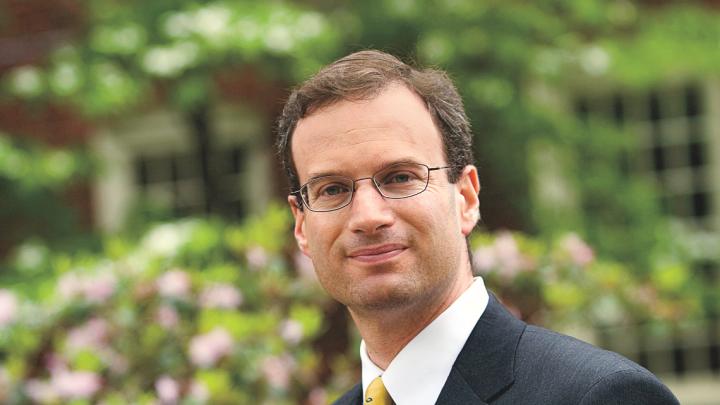Dan Shore, Harvard’s vice president for finance and chief financial officer since 2008, will relinquish that position at the end of September, it was announced today. He is joining Onshape Inc., a Cambridge-based company developing new systems for computer-assisted product design, engineering, and manufacturing.
Shore directed budgets and financial planning at Harvard for five years before assuming his current position on a permanent basis in October 2008—just as the financial crisis and ensuing recession caused a frightening decline in the value of the endowment, increased demand for financial aid, and, in general, ushered in a period of constraint throughout the institution. During his six years as CFO—in which capacity he is responsible for the controller’s office, budgeting and financial planning, risk management, auditing, treasury management, administration of sponsored research, and financial systems—Harvard has thoroughly overhauled most aspects of its financial operations. He and executive vice president Katie Lapp staff the reconstituted Corporation’s finance committee, which sets policy. There is a new Corporation facilities and capital-planning committee (also staffed in part by Lapp), and a new Harvard-wide capital-planning process. Multiyear budgets are being adopted to guide spending more carefully, and distributions from the endowment are now "smoothed" to buffer the effects of volatile investment returns. Liquidity needs are much more carefully coordinated with Harvard Management Company (HMC), which invests the endowment.
In recent years, Shore and the University treasurer, who sign the annual financial report, have used that document to try to convey a sober message about Harvard’s financial circumstances. In their overview of fiscal year 2012, Shore and then-treasurer James F. Rothenberg recounted the decline in the value of the endowment, and its slow recovery since fiscal 2009, and put that in the context of limited real (inflation-adjusted) growth in revenue from tuition (net of financial aid) and federally sponsored research (which is now declining). They foresaw a period of “endowment dependence and volatility, federal government dependence, non-endowment revenue stagnation, and a highly fixed cost structure.”
Those themes—and the call to maintain financial discipline, in face of understandable desires to launch new programs and initiatives—largely remain in place. Recent financial reports by other endowment, pension-fund, and private-equity investment managers suggest that HMC will report relatively favorable endowment returns for fiscal 2014 when it releases results in the early autumn. And early reports are that The Harvard Campaign is proceeding very well (although funds pledged do not, of course, immediately equal funds received). But the University’s financial planning assumes those outcomes, so it is unlikely that the narrative will change when the next financial report is issued, several weeks after Shore’s planned departure.
His decision means that Harvard faces a turnover throughout its financial-leadership team. As previously reported, Paul J. Finnegan succeeded Rothenberg as treasurer on July 1, and HMC president and chief executive officer Jane L. Mendillo announced in June that she would depart at the end of 2014. From the University’s standpoint, the timing of all these announcements is much more favorable than 2008, when Mendillo, like Shore, assumed her position. Then, the institution faced severe financial pressure, and its policies, systems, and personnel all needed to be adapted to cope—even as the overhaul of governance at the Corporation level was under way as well. Today, with those transitions effected, such changes in leadership can be handled as ordinary successions, following thorough, deliberate searches. No one assumes that any significant changes in policy or practice are pending as a result of the management turnover.
In a statement, Shore said serving as CFO had been "a true honor." He called his move to the new enterprise "the right opportunity at the right time, but Harvard has had a tremendous impact on me and I will be forever grateful for the quality and integrity of all my Harvard colleagues, and others throughout the Harvard community, who make this such a unique and remarkable place.”
In a message announcing the departure, President Drew Faust said:
Through a time of unusual challenge and change in the economics of higher education, including the 2008-09 global financial crisis and its aftermath, Dan has served Harvard with extraordinary incisiveness and an unrelenting devotion to assuring the University’s long-term financial well-being. He has skilfully shaped efforts to enhance the University’s multiyear financial planning and budgeting processes, while playing a leading role in the launch of the Corporation committee on finance. He has thoughtfully driven new approaches to how we address constraints on our revenue streams and growth in our costs, how we manage liquidity and debt, how we fund major initiatives and capital projects, how we procure goods and services, and how we deal with a wide range of other matters with important financial dimensions.
Throughout, Dan has been an excellent colleague and leader, with a remarkable talent not only for analyzing and explaining complex financial matters, but for developing foundational policies and practices conducive to Harvard’s meeting its financial challenges with both creativity and discipline. All of us who have had the pleasure to work with Dan will miss him both professionally and personally, and we wish him the very best in all that lies ahead.
As for Shore, who was a corporate lawyer and McKinsey strategy consultant before coming to Harvard, the move to a start-up apparently draws on all his experience, in a very different institutional setting. Onshape CEO John McEleney announced that Shore would serve as the company’s CFO, and cited his “broad experience in finance, strategy, and legal” as “a great fit as we look to reshape how the world designs products.”
And because he is a Cambridge resident, Shore can effect this change in his professional circumstances while enjoying a shorter commute to work—a circumstance many of his Crimson colleagues will especially envy.
There is no word yet on an interim successor or the search for a new University CFO.









